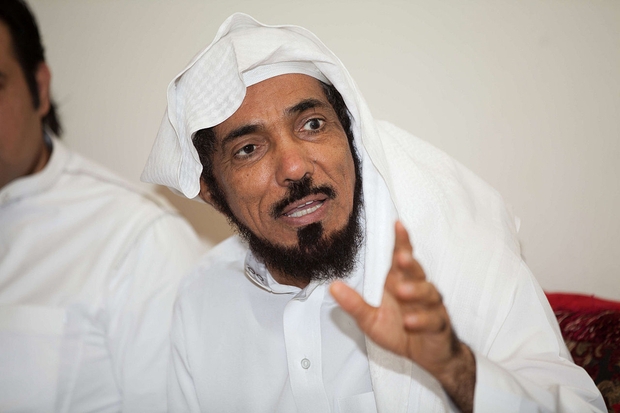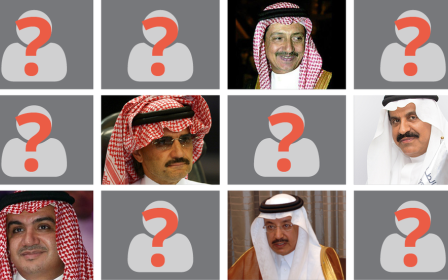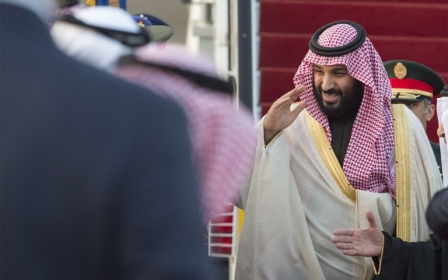Blindfolds and shackles: What 'gardening leave' meant for arrested Saudi scholar

A leading Saudi religious scholar has been held in punishing solitary confinement, shackled and subjected to 24-hour bouts of interrogation since his arrest last September for tweeting support for peace with Qatar, a source close to his family has told Middle East Eye.
Sheikh Salman al-Odah, 61, was taken from his home in Riyadh on 10 September, the same day Awad al-Qarni and Ali al-Omari, two other prominent scholars, were also arrested during a sweep that eventually led to more than 60 dissidents being put behind bars.
'We didn’t think they would mistreat him to that level that we knew later. So we were shocked'
- Source speaking about Salman al-Odah
Odah has not been charged with any crime and, with the exception of one phone call in October, was held incommunicado from his family until late February when they were allowed to visit him at Dhahban Prison in Jeddah.
In a widely circulated report by Saudi news website Anhaa, Odah was said to be happy as a "guest" in Dhahban prison and was "enjoying" a spot of gardening during break time.
But, according to the source close to the Odah family, the reality of his months in prison are far from relaxing.
Odah was "treated like hell", prevented from sleeping for several days in a row and had chains shackled on his feet for three months, the source said.
"We didn’t think they would mistreat him to that level that we knew later. So we were shocked," the source said.
During his detention, the source said, Odah has developed high blood pressure and told prison authorities he needed help, but was denied medicine and an evaluation "until he got very sick". At that point, he was taken to the prison's hospital.
Repeated questioning, including a session that lasted more than 24 hours, were nearly entirely focused on his tweets, particularly the tweet referencing the Gulf rift between Saudi Arabia and Qatar, according to the same source.
"So if anybody said they think he did this and that, it’s totally false – all they are thinking about are his tweets," the source said.
Revelations about Odah come with the arrival of Saudi crown prince, Mohammed bin Salman, in London where he has faced protests over the kingdom's treatment of dissidents and human rights defenders.
'We were shocked'
Odah, a popular scholar known for his powerful oratory and down-to-earth teachings, was imprisoned from 1994 to 1999 after agitating for political change in the kingdom.
Once released, Odah hosted a television show on the MBC network focused on politics, but the show was cancelled in 2011 after he voiced support for the Arab uprisings.
“The Gulf governments are fighting Arab democracy, because they fear it will come here,” he told the New York Times in 2014.
This January, as rumours swirled that Odah had died in prison, Anhaa said that the scholar was found happily taking a break in a garden at the Dhahban prison where "prison guests" grow fruit and vegetables in a relaxing environment.
According to Anhaa's account, Odah looked confused when asked whether he had been mistreated or tortured. "I have not been subjected to what you are saying at all. Even more than that, I have not heard that anyone has been tortured."
The account said that Odah went on to call bin Salman "the man of the future" and was critical of people who he said had used his case to blackmail the country.
"This is between me and the state," he was quoted as saying. "The leader's decision to stop me and others is for the benefit of the country and therefore we will stop."
Staged scene
But the source close to the family told MEE that the scene described in the article was entirely staged, with Odah taken by blindfold from solitary confinement and placed in a prison garden he never knew existed.
"When they uncovered his face and let him see the garden, he was angry," the source said. "He requested to go back to his cell instead because he doesn't like anyone to forcefully take him when he wasn't consulted in the first place."
Moments later, a journalist arrived to do the interview. "[Odah] said a lot of things were misquoted and lots of things misrepresented," the source said.
The journalist, Aziz Kasem, has said that he stands by his reporting and only wrote what he witnessed. "I did not accept even one riyal as I've been accused," he tweeted. "This article is my most pleasing piece of work to God."
Julia Legner, the regional legal officer for the Gulf at the Alkarama Foundation, a human rights group, told MEE that Odah's treatment recalls the recommendations made in 2016 by the UN Committee Against Torture during its review of Saudi Arabia.
The committee's recommendations included ensuring the prompt investigation of all allegations of torture and ill-treatment, the prosecution of perpetrators and the acknowledgement of the legitimacy of peaceful criticism.
The recommendations, Legner said, "rightfully highlight that the current situation is dire, legal safeguards are not being granted and the climate is conducive to torture and ill-treatment".
The Saudi embassy has been contacted for comment.
Stay informed with MEE's newsletters
Sign up to get the latest alerts, insights and analysis, starting with Turkey Unpacked
Middle East Eye delivers independent and unrivalled coverage and analysis of the Middle East, North Africa and beyond. To learn more about republishing this content and the associated fees, please fill out this form. More about MEE can be found here.




